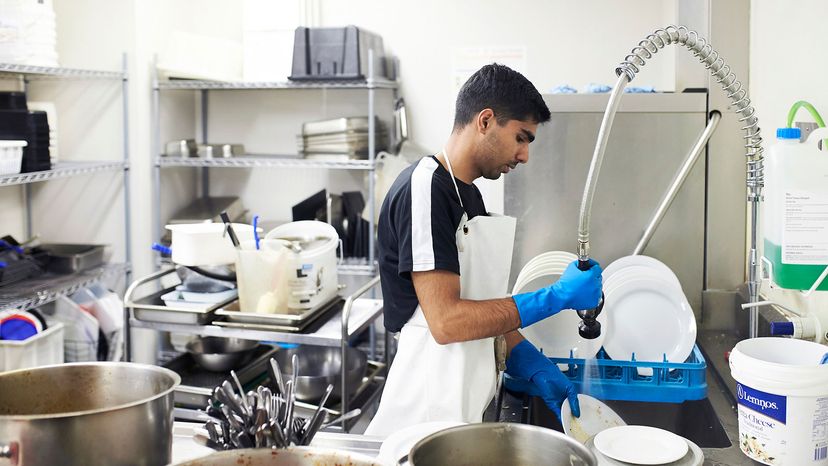 “Restaurants don’t usually allow amateurs inside the kitchen for liability reasons. James Braund/Getty Images
“Restaurants don’t usually allow amateurs inside the kitchen for liability reasons. James Braund/Getty Images
Imagine the embarrassment … You’re out on a date at a fancy restaurant. The food was scrumptious and the service superb, but when you hand your credit card to the server to pay the (pricy) bill, it’s declined. Your date, expecting you to pay, didn’t bring a wallet and you have zero cash. What now?
In the old days, you might have been forced to work off your debt in the kitchen washing dishes or dragging trash to the dumpster (it’s not clear if this ever really happened or is just a movie/TV trope). But for sure, it wouldn’t happen today. In modern restaurant kitchens, an untrained worker is more of a liability (a literal insurance liability) than a help.
If washing dishes is out, then how do restaurants deal with customers who simply can’t pay their bill? We spoke with a pair of restaurant industry veterans to get the inside scoop on how owners and managers handle this uncommon situation.
How Restaurants Really Handle This
Matthew Britt is a professor at Johnson & Wales University with years of experience as an executive chef and part owner of high-end restaurants in Washington, D.C. He says that 99.9 percent of the time, another diner in the party will step up and cover the bill, but in the rare case when a customer truly can’t pay, managers assume the best intentions. (If a customer really planned to "dine and dash," they would have dashed before the bill arrived.)
"As hospitality professionals, we do our best to make sure the person who cannot pay feels like it’s OK and that we’ll work with them to make this situation go away," says Britt, who admits that it can still be "a very awkward conversation."
Britt knows what it’s like to be on the other side of that awkward conversation. One time he was traveling for work in Denmark and forgot to tell his bank that he was out of the country. When the bill came at an expensive restaurant, his card was declined and he was thousands of miles from home.
"I had no intention of not paying my bill; in fact, I was proactively losing my mind," says Britt. "I had to pay. Luckily I got hold of my bank and they unblocked the card."
If It’s Cheap Enough, They’ll ‘Comp’ the Meal
Shawn Bucher is a chef and cookbook author with experience as both a manager and restaurant owner, most recently of a "fast casual" burrito joint. He says that while it isn’t a "frequent occurrence" to have a customer who can’t pay, it definitely does happen, and in most cases the restaurant simply "eats it," meaning it swallows the cost.
"The management team is more concerned about saving face and doing the ‘right thing’ by writing it off and voiding the transaction," says Bucher. "It’s more economical for us to pay for the meal and move people along than to get into a drawn-out conversation or try to mail the customer a bill."
Britt agrees, especially when the unpaid bill is relatively small.
"Every restaurant has ‘comps’ built into the budget that can be used for staff, friends or VIPS," says Britt. "The goal of any successful restaurant is to not use these comps, but if someone orders a $20 meal and can’t pay, the manager will probably just comp that. At the end of the day, it’s not worth going through a longer process."
No Cash? How About Collateral?
Comping a $20 meal every once in a while won’t hurt a restaurant’s bottom line, but when there’s a $75 porterhouse steak and a top-shelf bourbon on the unpaid bill, "the conversation can definitely change," says Britt.
If the servers or staff recognize the customer as someone who’s dined there before, the manager will probably just send the embarrassed customer off with a friendly "IOU" and the expectation that they will settle up ASAP.
If a first-time customer can’t pay for a substantial bill, some managers will ask them to leave collateral until the bill is paid.
"People carry a lot more collateral on themselves nowadays — iPhones, Apple Watches — which are probably worth more than they can eat in one sitting," says Britt, and that provides a strong incentive to come back and pay up.
Calling the police for an unpaid check is "the nuclear option," says Britt, meaning it should be avoided at nearly any cost. "When law enforcement gets involved, now you have uniformed officers in the restaurant disrupting what’s supposed to be a relaxing environment."
Why You Can’t Pay Off Your Debt Washing Dishes
For starters, because the FDA says so. According to the U.S. Food and Drug Administration: "PERSONS unnecessary to the FOOD ESTABLISHMENT operation are not allowed in the FOOD preparation, FOOD storage, or WAREWASHING areas," which is an overly complicated (and capitalized) way of saying, if you don’t work at the restaurant, you’re not allowed in the kitchen, and that includes washing dishes.
Also, modern restaurant kitchens are tightly choreographed spaces full of knives, flames and scalding hot liquids. Inviting an untrained "volunteer" into a restaurant kitchen is inviting an accident and a lawsuit.
"That would never happen for liability issues," says Bucher. "There are way too many ways they could hurt themselves."
The only people covered by a restaurant’s insurance are employees or a customer who gets sick from bad food, not a customer who gets his hand caught in the industrial dishwashing machine.
Now That’s Not Cool
You can absolutely get arrested for failure to pay a restaurant bill. Just ask the Illinois man who was sentenced to three years in prison for skipping out on a $70 tab. It wasn’t his first offense.































